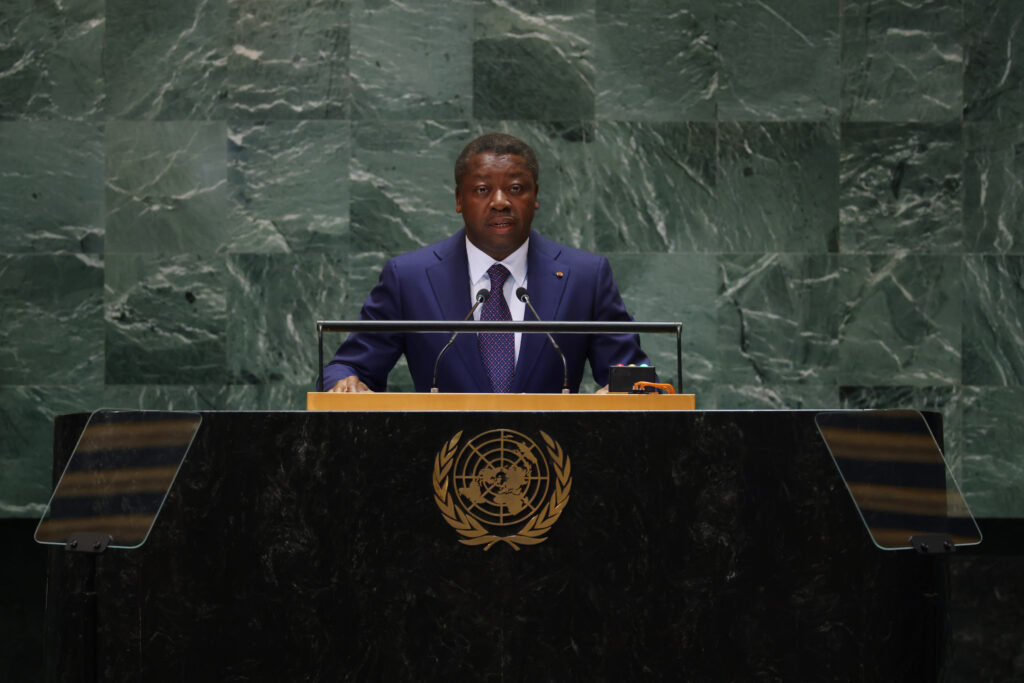Togolese artists and activists living abroad have responded to intimidation of anti-government protesters in the country by spearheading a digital revolt to keep up pressure on President Faure Gnassingbe to leave power.Young people in the tiny west African country began taking to the streets in June to protest at the arrest of government critics, a rise in electricity prices and, especially, the new constitution. The latter allows Gnassingbe, who took power in 2005 following the death of his father Eyadema, to stand for election as many times as he likes. Eyadema ruled for 38 years, which means Togolese under the age of 60 cannot remember a time when the country was not ruled by the Gnassingbe dynasty.The demonstrations began in response to calls for civil disobedience sent out on TikTok and Facebook by the June 6 Movement (M66), whose name refers to the president’s birthday and the day the protests began. The authorities banned the demonstrations in advance and violently quashed those that took place. The online revolt, begun by four overseas-based Togolese citizens, is now supported by hundreds of influencers, bloggers, musicians and actors from the diaspora. Singer Zaga Bambo, who has hundreds of thousands of followers, regularly complains to camera that Togo’s leaders have “manipulated” young people and failed to invest in education, and relays comments from “mothers tired of (Gnassingbe’s) rule”. The digital movement aims “to speak out for others, given that silence and fear reign in Togo”, M66 communications officer Solim Kolani told AFP. Civil organisations say the crackdown by the authorities, which left at least seven people dead and dozens injured in June, is making it difficult to mobilise on the ground. Arrests continue, including last week of two government critics, former defence minister Marguerite Gnakade and popular rapper Aamron. Both were charged and Aamron has been released. – TikTok and Bitchat – M66 describes itself as a “citizens’ organisation” with no political affiliation that is “committed to democracy, social justice and progress”. Although still in its infancy, it hopes to take the protests international, with a dynamic social media campaign and the help of Togolese citizens living abroad or in exile. It is also working behind the scenes to structure the protest movement at home by creating more secure channels of communication for people to organise themselves. In the past, protesters frequently turned to WhatsApp but M66 advises against communicating via the platform because the Togolese authorities used Israeli Pegasus spyware on WhatsApp to arrest people in 2017 and 2018, activist Farida Bemba Nabourema said. The diaspora now communicates with people in Togo “80 percent via TikTok”, said Nabourema, who acts as an adviser to the M66 which describes itself as leaderless. The next step is to prepare “for the eventuality of the regime cutting off internet access completely”, she added. That means encouraging people to use Bitchat, a messaging system accessible via Bluetooth. – International arrest warrants – The digital revolt resonates particularly with young people. Under 25-year-olds make up 60 percent of the population in Togo, where 43 percent live in poverty and those jobs that are available are overwhelmingly in the informal sector — unregulated, often poorly paid and with few rights or protections. In late August, nearly 600 people gathered in Paris in response to a call from M66. The Togolese government has been rattled by the movement, as elusive as it is popular, announcing on July 9 that it had issued international arrest warrants for members based in Canada, France and the United States. They are accused of “inciting hatred, insurrection and murder” and of “aggravated public disorder”, Togolese Human Rights Minister Pacome Yawovi Adjourouvi told AFP. He condemned what he said was an “attempt to create a pseudo-crisis” via social media to “frighten our fellow citizens and destabilise Togo”. Nabourema said the Togolese authorities were fighting back online too, namely by “buying bots in Arab and Asian countries”. She said her own Facebook account was regularly inundated with hundreds of threatening messages. “They have also invested heavily in influencers from other African countries to give Faure Gnassingbe a different image on the web,” she said. One, Ivory Coast’s “LESLY QUEEN 5ETOIL”, had more than 250,000 followers on TikTok. She posts video clips — in which she describes herself as “Papa Faure’s daughter” — praising the president and “development in Togo”. She was contacted by AFP but had not responded by the time this article was published.
